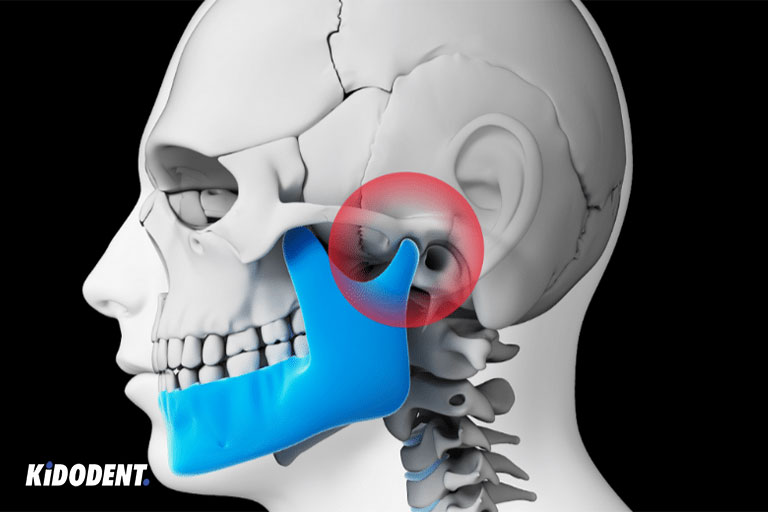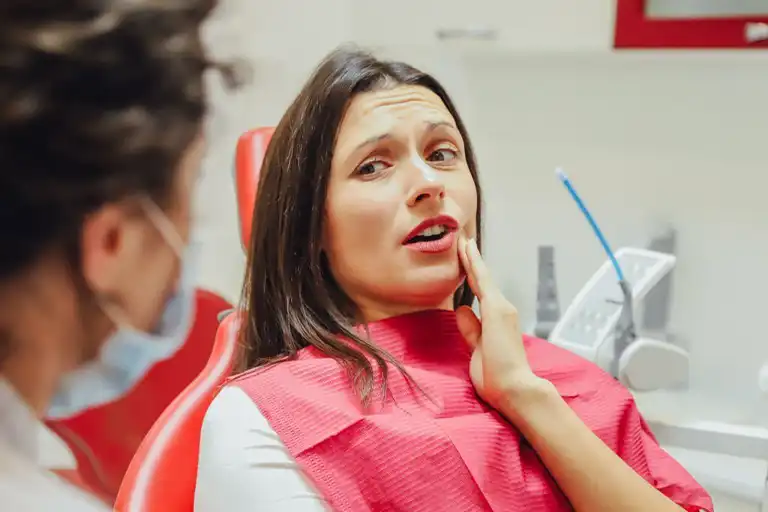TMJ disorder can be caused by damage to the jaw joints or surrounding tissues. Pain from TMJ disorder is often described as a sharp pain that radiates from the joint to the other parts of the face and even spread to the neck and shoulders. This pain becomes more intense with talking, jaw movement, chewing, and similar behaviors. If you are experiencing TMJ dysfunction, there are certain habits you need to avoid which can make your TMJ disorder worse. Read on to find out about this and other information about TMJ headache.
What is TMJ?
TMJ stands for temporomandibular joint. The temporomandibular joints are located on either side of your head, just in front of your ears. TMJs connect your lower jaw bone to your skull and help with movements like chewing and talking.
Temporomandibular joint disorder can be caused by a problem in the TMJ joint itself or the muscles around it. The most common symptom of temporomandibular joint disorder is dull pain in this area. In addition, TMJ disorder can cause headaches, earaches, neck stiffness, and clicking noises in the jaw.
Common symptoms of TMJ
TMJ can appear with various signs and symptoms. It requires professional diagnosis by a dentist or a TMJ specialist to make sure if you are suffering from the condition or not.
Common symptoms of TMJ disorders may include:
- Jaw pain
- Headache
- Pain in the neck or shoulders
- Difficulty opening the mouth completely
- Jaws that “lock” in or closed mouth position.
- When opening or closing the mouth, a click, sound or grating occurs in the jaw joint.
- A tired feeling on your face
- Difficulty chewing
- Ear pain or other ear symptoms such as tinnitus or ringing in the ears
- Changes in the way the teeth fit together
- Swelling on the side of your face
- Toothache

9 things that make TMJ disorder worse
TMJ can be worsened by a variety of factors, including:
1-Stress and anxiety
When you’re bored, anxious, or stressed, do you chew a pencil or pen? By straining the jaw, unnecessary chewing can trigger TMJ symptoms. Stress can cause tension in the jaw muscles and increase the possibility of teeth clenching or grinding.
2-Chewing gum
Chewing gum is another example of putting your jaw under pressure. Chewing gum can be fun, but not when causing problems. As the jaw is the most active joint in the body, limiting the usage of joints and muscles is necessary to relieve pressure and permits them to rest. The initial step in treating TMJ symptoms is resting aching muscles and joints. If you chew gum frequently throughout the day, this will only continue to strain your jaw.
3-Hard foods
There are certain foods that can aggravate TMJ symptoms, such as hard or chewy foods that require a lot of chewing. This includes raw vegetables or tough meats which can put more pressure on the jaw joint.
Avoid eating sticky and sweet foods and fruits. Also, eating large bites and foods that require excessive jaw movement causes the jaw muscles to overwork and put pressure on them, thus aggravating TMJ symptoms.
4-Poor posture
Slouching and poor posture can lead to back and neck problems and TMJ is not an exception. Your jaw works best when your head rests comfortably above your cervical spine, and when your posture is straight. If you slouch, your jaw muscles have to work harder to open and close your jaw. If you have a bad habit of slouching, you can try different exercises or posture correctors.
When standing, distribute your body weight evenly to the front, back, and sides of your feet. Place your computer or phone such that you are not continually looking down. Also, take regular breaks.
Align the ear lobes, shoulder blades, and hips in a single vertical line.
5-Chewing with one side
Be aware of your chewing habits and chew food with both sides of your mouth. Chewing on one side of your mouth affects and puts pressure on the jaw and temporomandibular joints.
6-Teeth grinding or clenching
Grinding teeth, also known as bruxism, can make TMJ worse. Clenching and grinding of teeth can happen due to stress, misalignment of teeth, lifestyle habits like smoking or alcohol consumption, genetic factors, and certain health conditions. The key to preventing yourself from clenching and grinding is to see your TMJ dentist for treatment. Bruxism is a serious problem which can damage your teeth. It can put too much pressure on the jaw muscles.
7-Injury or trauma
Injury or trauma is something that can affect your jaw and lead to TMJ. A blow to the head or face can cause damage to the jaw joints along with the skull. Whiplash, or anything that impacts how you carry your head on the top of your neck, can cause jaw problems.
8-Resting on the chin
The jaw works best when your posture is upright. Bending or stooping can put a strain on the neck and shoulder muscles, which can also affect the jaw.
This position may be comfortable, but it affects the jaw. This movement can put pressure on the jaw joints, dislocate the disc, and cause problems in opening and closing the jaw.
9-Dental problems
Crowding of teeth occurs when there is not enough space for teeth to grow. Misalignment of teeth can put pressure on the jaw joint and lead to TMJ symptoms. Also, this situation is the most common reason for turning to orthodontic treatment in most people. Crowded and cluttered teeth are not only unsightly, but are also associated with gum disease and tooth decay, as it is difficult to clean crowded teeth.

Treatment
Treatment for TMJ may involve:
- Exercises for normal jaw movement. The physical therapist can help with exercises to strengthen and stretch the jaw muscles, as well as provide massage and other manual therapy.
- Simple home tips including eating soft foods, avoiding chewing gum, applying heat or cold packs to the affected area, and practicing relaxation techniques.
- Anti-inflammatory treatments and over-the-counter pain relievers such as ibuprofen or acetaminophen can help reduce pain and inflammation.
- Depending on the cause of TMJ, dental treatments such as bite adjustment, orthodontic treatment, or dental appliances such as splints or mouth guards may be recommended.
- In severe cases, surgery may be necessary to repair or replace the damaged joint structures. It is usually a last resort and recommended only when other treatments have failed.
How is TMJ diagnosed?
The temporomandibular joint disorder is diagnosed by a dentist or a doctor specializing in the treatment of head and neck diseases. Diagnosis is usually based on a combination of the patient’s symptoms and physical examination. In addition, radiography (x-rays) may be used to view the jaw joints and determine the extent of damage.
You can check the range of motion when opening and closing the mouth. Squeeze your face and jaw to identify areas of discomfort. As you open and close your mouth, feel around your jaw joints.
Conclusion
If you feel that you may have symptoms similar to those of TMJ, be sure to see a dentist or doctor first for a detailed examination because there are a number of diseases that can have symptoms similar to TMJ disorder.
If you are diagnosed with TMJ disorder, first of all try to be patient and flexible. The good news is that with simple measures such as self-care and small lifestyle changes, the condition of most patients with TMJ disorder can be greatly improved.
